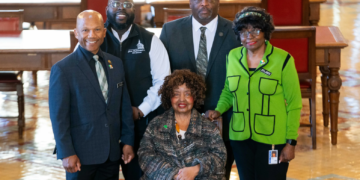Feb 28, 2025 Story by: Publisher
This article has been updated to reflect Bank of America, Capital One, Morgan Stanley, and Wells Fargo scaling back policies on diversity.
In the aftermath of nationwide protests following the 2020 police killing of George Floyd, many corporations embraced diversity, equity, and inclusion (DEI) initiatives. However, a growing number of companies are now scaling back or discontinuing these efforts.
Conservative activists, bolstered by the U.S. The Supreme Court’s decision to outlaw affirmative action in college admissions has targeted DEI programs through legal challenges and social media campaigns. These efforts have scrutinized corporate sponsorships, employee-led affinity groups, and hiring practices aimed at historically marginalized groups.
DEI policies were initially designed to counteract discriminatory practices. Critics, however, argue that such initiatives unfairly single out participants based on factors like race, gender, or sexual orientation, and believe opportunities should be equally accessible to everyone.
Here’s how some major companies have adjusted their DEI strategies:
Wells Fargo
The San Francisco-based bank is discontinuing a recruitment policy that requires diverse slates of candidates in the first round of interviews for senior-level roles in the US, according to a memo to staff seen by Bloomberg News. Training on diverse slates also will be removed from the recruitment process, according to the memo, distributed to senior leaders this week.
“In light of the current environment, we have decided to discontinue the diverse slate guidelines,” Wells Fargo said in the memo, adding that the bank will still “source a broad pool of candidates” when recruiting. “We remain focused on maintaining a workplace where we hire the best and most qualified people and one where everyone has equal access to opportunities to grow.”
Wells Fargo previously required a 50% diverse candidate slate and a diverse interviewer panel, according to an August 2022 statement.
Bank of America
Where the “Diversity and Inclusion” section in Charlotte, North Carolina-based Bank of America’s 10-K was last year is instead a section in this year’s filing titled “Talent, Inclusion and Opportunity.” It refers to the bank’s approach to recruiting, hiring, employee networks, and training and development, without mentioning diversity, equity, or inclusion.
A table breaking down workforce demographics – called “Diversity Metrics” in last year’s filing – is referred to as “Workforce data” in this year’s. This year’s filing does break out the share of U.S.-based employees identifying as American Indian/Alaskan Native, Native Hawaiian/Other Pacific, or “Two or More Races.”
Last year’s filing mentioned a “diversity and inclusion strategy, programs, initiatives, and policies,” and noted the bank’s “Global Diversity and Inclusion Council, which has been in place for over 20 years, is chaired by our CEO and consists of senior executives from every line of business and region.”
There’s no mention of that council or the diversity and inclusion strategy, programs, initiatives, or policies in this year’s filing. A person familiar with the matter said the council is being renamed the “Global Opportunity and Inclusion Council.” BofA is also swapping out the “diversity” in a “diversity and inclusion” internal human resources group name, in favor of “opportunity and inclusion,” the person said.
Additionally, the bank will no longer have aspirational DEI-related goals or require a diverse slate of candidates for open roles. Those changes at the bank, which is a government contractor, were driven by the Trump administration’s DEI executive order, the person said. Those changes mirror similar moves at Citi, announced last week by CEO Jane Fraser.
Capital One
In Capital One’s case, the entire section labeled “Diversity, Inclusion and Belonging” in 2024’s filing is absent from the 2025 version.
Further, while both years’ filings stress that “pay equity is an important element of our pay philosophy,” the statement, in 2024’s filing that Capital One pays women “100% of what men are paid” and U.S.-based racially and ethnically diverse associates “100% of what white associates are paid” – according to the bank’s own analysis of aggregated adjusted pay gap results – does not appear in Thursday’s.
Morgan Stanley
This year’s annual filing from Morgan Stanley, posted Friday, does not feature the subheading “Diversity and Inclusion,” where the report from a year ago did.
Citigroup
Citigroup is scaling back its policies around diversity, the latest US company to retreat from targets to promote a more inclusive workforce.
In a memo to staff on Thursday, chief executive Jane Fraser wrote that the bank would no longer have aspirational representation goals unless required by local law, and nor would it require “diverse slates of candidates and diverse panels of interviewers”.
Citi had set diversity goals in 2022 for assistant vice presidents up to managing directors to be at least 43.5 percent women, 11.5 percent Black, and 16 percent Latino. As part of the changes, Citi is also changing the name of its “Diversity, Equity and Inclusion and Talent Management” team to “Talent Management and Engagement”.
Goldman Sachs
Investment firm Goldman Sachs confirmed that it was dropping a requirement that forced IPO clients to include women and members of minority groups on their board of directors.
“As a result of legal developments related to board diversity requirements, we ended our formal board diversity policy,” said a Goldman Sachs spokesman in an email to The Associated Press. “We continue to believe that successful boards benefit from diverse backgrounds and perspectives, and we will encourage them to take this approach.”
Goldman Sachs said that it will still have a placement service that connects its clients with diverse candidates to serve on their boards.
Google is scrapping some of its diversity hiring targets, joining a lengthening list of U.S. companies that have abandoned or scaled back their diversity, equity, and inclusion programs. The search engine’s online and mobile calendars no longer include reference to the first day of Black History Month, or Women’s History Month, among other holidays and events.
A Google spokesperson said the changes took place in the middle of last year.
“Some years ago, the Calendar team started manually adding a broader set of cultural moments in a wide number of countries around the world,” the spokesperson said in an email. “We got feedback that some other events and countries were missing — and maintaining hundreds of moments manually and consistently globally wasn’t scalable or sustainable,” the spokesperson added.
The move, which was outlined in an email sent to Google employees on Wednesday, came in the wake of an executive order issued by President Donald Trump that was aimed in part at pressuring government contractors to scrap their DEI initiatives.
Like several other major tech companies, Google sells some of its technology and services to the federal government, including its rapidly growing cloud division that’s a key piece of its push into artificial technology.
Google’s parent company, Alphabet, also signaled the shift in its annual 10-K report it filed this week with the Securities and Exchange Commission. In it, Google removed a line included in previous annual reports saying that it’s “committed to making diversity, equity, and inclusion part of everything we do and to growing a workforce that is representative of the users we serve.”
The representation of Black people in the company’s leadership ranks rose from 2.6% in 2020 to 5.1% last year, according to Google’s annual diversity report. For Hispanic people, the change was 3.7% to 4.3%. The share of women in leadership roles, meanwhile, increased from 26.7% in 2020 to 32.8% in 2024, according to the company’s report.
The numbers aren’t much different in Google’s overall workforce, with Black employees comprising just 5.7% and Latino employees 7.5%. Two-thirds of Google’s worldwide workforce is made up of men, according to the diversity report.
Target
Target announced changes to its “Belonging at the Bullseye” strategy, including the discontinuation of a program created to support Black employees, enhance Black shoppers’ experiences, and promote Black-owned businesses. The retailer, headquartered in Minneapolis, also ended its three-year DEI goal cycles, which included hiring and promoting women and racial minorities and sourcing from diverse suppliers.
Additionally, Target will no longer participate in surveys like the Human Rights Campaign’s annual index and will reevaluate its corporate partnerships to align more directly with business objectives.
Meta Platforms
Meta, the parent company of Facebook and Instagram, is phasing out its DEI program. Policies related to hiring, training, and vendor selection have been eliminated, citing the Supreme Court’s affirmative action ruling as a pivotal factor.
An internal memo revealed Meta’s intent to focus on “fair and consistent practices that mitigate bias for all, no matter your background.” The company also ended its “diverse slate approach” for hiring, a policy requiring a diverse pool of candidates for every open role.
Joel Kaplan, Meta’s global policy chief, emphasized that the move aims to prioritize “building teams with the most talented people” rather than basing hiring decisions on protected characteristics.
Amazon
Amazon announced plans to wind down certain DEI programs. In a memo, senior HR executive Candi Castleberry noted that the company is focusing on initiatives with proven outcomes and fostering a more inclusive culture. She added that outdated programs would be phased out by the end of 2024.
Amazon has removed any reference to diversity from its latest annual report. The company filed the report for 2024 on Friday, Feb. 14, following the release of its fourth-quarter earnings.
McDonald’s
McDonald’s declared it would retire diversity goals for senior leadership and end a program encouraging suppliers to enhance diversity within their ranks. The fast-food giant will also pause participation in external surveys, including the Human Rights Campaign’s index.
Despite these changes, McDonald’s leadership affirmed its commitment to inclusion, stating that a diverse workforce remains a competitive advantage.
Walmart
Walmart decided not to renew a five-year commitment to a racial equity center established in 2020 and ceased participating in the Corporate Equality Index. The company also announced it would no longer use race or gender as criteria for supplier contracts or gather demographic data for grant eligibility.
Ford
In August, Ford CEO Jim Farley informed employees of changes to DEI policies, including withdrawing from the HRC index. While reaffirming the company’s commitment to a safe and inclusive workplace, Farley stated that resources would focus on customers, employees, and communities rather than “polarizing issues.”
Lowe’s
Lowe’s streamlined its employee resource groups into a single organization and ended sponsorships for events like Pride festivals. The company also withdrew from the HRC index following a review of its DEI programs prompted by the Supreme Court ruling.
Harley-Davidson
Harley-Davidson announced it would reevaluate sponsorships and training programs, shifting focus to business needs while eliminating socially motivated content. The company will no longer set hiring quotas or maintain supplier diversity spending goals.
Brown-Forman
The parent company of Jack Daniels ceased participating in the HRC index and adjusted its diversity strategy. Leaders noted that evolving business needs and legal changes prompted the decision. While removing quantitative diversity goals, the company emphasized fostering an inclusive environment.
John Deere
John Deere halted sponsorships for “social or cultural awareness” events and committed to reviewing training materials to exclude socially motivated messages. The company reiterated its stance against diversity quotas and pronoun identification policies.
Tractor Supply
Tractor Supply ended its DEI roles, discontinued corporate sponsorships unrelated to business objectives, and withdrew from its carbon emission goals. The retailer faced backlash from the National Black Farmers Association, which called for the resignation of its CEO.
As these companies revise their DEI policies, the changes reflect broader societal and legal shifts, highlighting the evolving landscape of corporate commitments to diversity and inclusion.
Source: TIME /Bankingdive

















